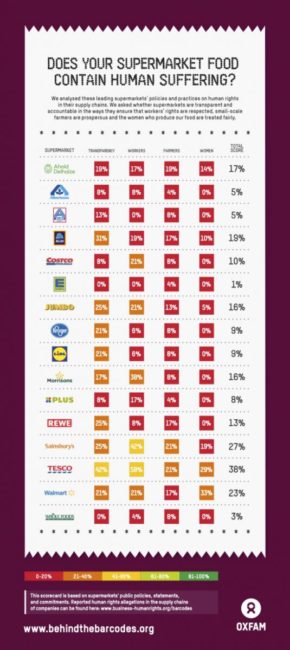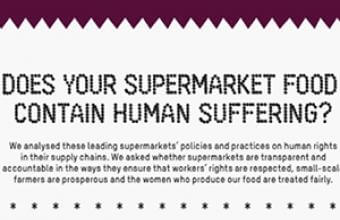Last year, Oxfam embarked on a campaign asking 16 supermarkets to take responsibility for ending human suffering in their food supply chains. A year on, Monica Romis asks, what has changed?
Slow progress to respect human rights
The 2019 Supermarket Scorecard shows that, while some are doing better than others, all supermarkets lack sufficient policies to properly protect the people who produce our food. No supermarket does even 40% of what the Oxfam benchmark asks them to.
Eight of the 16 companies, including Lidl, Plus and Whole Foods, have made little to no improvement at all, reinforcing their position as laggards. Others, such as Sainsbury’s and Walmart have made limited improvements to their policies.
However, some supermarkets – Ahold Delhaize’s Dutch subsidiary Albert Heijn, Aldi South, Jumbo, Morrisons, Rewe and Tesco – made important new policy commitments to ensure the women and men in their supply chains are treated fairly. These examples show that, while change is possible, most companies move slowly, and in response to public pressure.

Note: The score of a parent company applies to any subsidiary companies; for example, Asda’s score is based on Walmart’s assessment and Albert Heijn’s on Ahold Delhaize’s.
Moving towards transparent policies and practices
Some supermarkets have made significant strides in disclosing their human rights policies and practices. Compared to very few supermarkets in last year’s assessment, eight of the 16 companies assessed in 2019’s scorecard have:
- Committed to the United Nations framework (UNGPs), which ask companies to ‘know and show’ where human rights risks are in their supply chains; and
- Become more accountable by identifying who at the top of the company is responsible.
Dutch supermarkets Albert Heijn (subsidiary company of Ahold Delhaize) and Jumbo were the first to publish human rights policies in response to our campaign. They are the only two of the 16 who have committed to publish who their first-tier suppliers are for their private label products. Consumers will now know where their products have come from, and farmers and workers will know who is buying their produce. This shows supply chain transparency is possible, and we urge other supermarkets to follow suit.
Similarly, after public pressure in multiple countries, German retailer Aldi South published its first human rights policy, and has begun to show where and what kinds of human rights risks exist within its supply chains. This has resulted in an 18% scorecard increase for Aldi South– the biggest improvement of all.
Human rights due diligence
Proper human rights due diligence, in line with UNGPs, is central to Oxfam’s recommendations to food retailers. This year, eight of the 16 supermarkets proactively sought to identify and prevent the highest risks of human rights abuses. Four companies – Ahold Delhaize, Aldi South, Jumbo and Tesco – went deeper, committing to carry out human rights impact assessments through meaningful engagement with unions, civil society organizations and affected communities.
Emerging good practices in promoting workers’ rights
Looking closely at how companies promote workers’ rights, UK supermarkets Tesco, Sainsbury’s and Morrisons are relative frontrunners. This is due to longtime participation in multi- stakeholder initiatives like the Ethical Trading Initiative and the strong UK government framework on modern slavery.
Tesco stands out for making meaningful commitments, and taking actions to increase workers’ representation and wages. It is the only company reaching over 50% of what companies should be doing, as assessed in the ‘workers’ theme of the scorecard.
On the topic of ‘workers rights’, two main areas of progress stand out:
- Forced labour prevention – over half of the companies commit to proactively prevent forced labour, including at the recruitment stage – a key measure to prevent modern slavery, although Oxfam continues to monitor the implementation of a company’s commitment.
- Cutting and running – nearly half also commit not to ‘cut and run’ from suppliers when labour exploitation is exposed – a practice that penalizes workers.
Failing to protect farmers’ and women’s rights
While many supermarkets say that they support small-scale farmers to thrive, almost no measurable progress is reflected in their policies and practices. The only meaningful action is to sell certified Fairtrade products, which nearly all now do.
And when it comes to explicit respect for the rights of women workers and producers, almost all companies fail – and only six have any measures in place at all. While supermarkets ‘get’ the fact that women face more challenges such as earning less than men for doing the same jobs, their policies and practices fall short. Only Tesco and Ahold Delhaize made significant improvements this year, to join frontrunner Walmart in systematically addressing women’s rights in their global supply chains.
Where do supermarkets need to do more?
While some companies are making real progress in certain areas, others lag behind. Four areas consistently stand out as priorities for action:
- Supply chain transparency. No supermarket currently gives consumers basic information about the suppliers they buy their food from. Albert Heijn and Jumbo have said they will by 2020.
- Living wages. No supermarket ensures that the workers and producers in their supply chains are paid enough to eat properly. However, Tesco has committed to conduct a living wage assessment in its supply chains.
- Gender equality. Bar Sainsbury’s and Walmart, no supermarket supports suppliers who take gender equality seriously, or source more from women-owned businesses.
- Unfair trading practices. Supermarkets use a range of practices that pressure suppliers – squeezing their ability to pay workers a living wage. Low-price policies in particular contribute to the exploitation of workers. This undermines any good efforts companies place in other areas. Only three supermarkets have committed to eliminate these practices, but no meaningful actions have been disclosed.
While we celebrate the progress that is being made by a few leading companies, it must be acknowledged that large gaps remain for the majority of supermarkets assessed. Half of the 16 companies have barely improved at all, and their scores reflect this. However, the first year of the campaign has shown that, with improved understanding and public pressure, companies will move.
Oxfam remains committed to ongoing engagement with all the supermarkets involved in our campaign and will continue to share knowledge, and offer guidance when needed. Our supporters and allies will keep campaigning to accelerate this process of change so that in future workers and small-scale farmers do not have to suffer to produce our food.
Reproduced from https://www.oxfam.org.uk/
